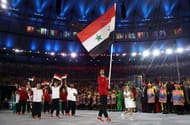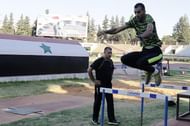Exactly two months before the 2012 London Olympics, Majd Eddin Ghazal was harbouring dreams of becoming the first ever medallist in athletics from Syria. However, his plans took a major hit merely weeks before the sporting extravaganza, in the unlikeliest of circumstances.
A bomb hit the Damascus National Stadium where he was training and killed 15 people from the Syrian Olympic Committee staff, including the Vice President. The high jumper and his coach Imad Sarraj narrowly survived with scars from the debris on their bodies.
Following that incident, Ghazal was forced to stay under house arrest for close to a month. He lost as many as 15 relatives to the civil war, compounding his misery.
At the ongoing Asian Indoor and Martial Arts Games in Ashgabat, Ghazal has used his literal and figurative scars of war as a catalyst for escape.
He says, “Success has a very nice way of making you forget what’s happening back home. The bomb landed around 300m away from me and destroyed the administrative offices of the stadium. I couldn’t believe it; I was in a state of shock, and my immediate response was to run away. What else could I have done?
“Watching my fellow Syrian teammates lying there, knowing that they will never get up again… I wasn’t even supposed to be there during that time. I had only returned to nurse an injury, and then that happened.”
Ghazal had contemplated skipping the Olympics, but the Syrian Olympic Committee convinced him to go. He adds, “They came and told me that I would be the flag bearer for the tournament. I had no idea how to respond to that -- should I be happy or sad? Images of that day kept flashing by every day and my ears had gone numb for weeks."

“As we were discussing our participation, we could hear gunfire and explosions outside the house. However, it was our message to the world, that we as a country believe that sport is the only way to unite a country in distress.”
Not surprisingly, Ghazal failed to better his personal best of 2.31m from Beijing, registering a jump of 2.16m. He missed out on a spot in the final but the experience of representing his country at the Olympics, while a civil war raged in his country, sent out a strong message.
‘It was not about winning, it was about showing the world that we will never stop’
He adds, “I knew I was going to be ordinary, I had not practised in a month. The only practice I got was when I reached London. As I said, for us it was never about winning; it was about showing the world that we will continue doing what we love, even if circumstances are against us.”
And boy was he right. Ghazal’s meteoric improvement in results after 2012 fully justifies his statement. Since 2012, he has won four Asian silver medals, two Arab Games gold medals and a World Championship bronze. However, the one accolade he rates the highest is his gold medal from the ongoing Asian Indoor Games.
Syria has sent one of the smallest contingents to the games – of just 27 athletes – due to the volatile political situation back home. The Syria Olympic Committee has been essentially dysfunctional for the past two months as Ghazal admits, “Unfortunately, due to shelling, our Committee office had to be shut down two months ago. We prepared in an ad-hoc manner for this particular event. This is the last major tournament for the season. My gold medal here is a response to the Olympic Committee office being shut down."

“People might want to stop sport in our country, but our success will always respond to them. Be it me or our football team, we want to show to the world that sport does not care about the war and it is the only thing that unites us all,” he adds.
It was only recently that Ghazal shifted back to Syria, resuming a life of normalcy. For close to a decade, he stayed in Belarus with former Coach Aleksandr Kotovich, under whom he broke the 2.24m barrier for the very first time at the Belarussian Nationals and also reached the World Championship Top 8. He would eventually win gold at the Asian Indoor Games in Doha as well.
'I welcome you to my home'
He says, “I was scared returning to Damascus. When I returned for training, the stadium was repaired but I could still the damage from that day. The jumping area was renovated and I could still see the marks."
“I won’t lie, it was difficult coming back. However, I have started training there again for the past three months and there has been no problem. There is adequate security and now people recognise me back home as well."
“I welcome you to my home there, and I want you to come and see how it is now,” he quips.
Ghazal registered a jump of 2.26m to win gold ahead of Keyvan Zadeh of Iran, who equalled the Syrian’s score but only on his third attempt. In the process, Ghazal even bettered his score from the Asian Indoor Championships last year of 2.24m.

He says, “This tournament was very important for my country. Although my area is very safe right now, other areas like Aleppo are still struggling and I want to dedicate this to my people who are fighting every day and never giving up. We are strong people, and every day we show that again and again."
“If we wanted we would not have come, and stayed home (instead). But every athlete wants to win here in Ashgabat as much as anyone else. We will not make an excuse about it; we are here and we will compete to the best of our abilities. Regardless of our situation, we will be the best.”
As the Syrian national flag was being hoisted by officers of the Turkmenistan Army, you could see a tear roll down Ghazal’s eye. He says this was one of the proudest moments of his life, and that Ashgabat has given him a reason to be happy during a tough time.
Regardless of what happens with Syria’s domestic situation, the likes of Ghazal are giving the West Asian country an unlikely reason to celebrate. And that’s something worth raising our glasses to.
